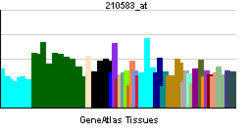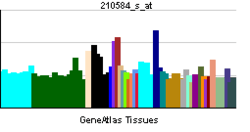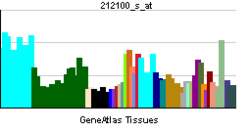POLDIP3
| Polymerase (DNA-directed), delta interacting protein 3 | |||||||||||||
|---|---|---|---|---|---|---|---|---|---|---|---|---|---|
| Identifiers | |||||||||||||
| Symbols | POLDIP3 ; PDIP46; SKAR | ||||||||||||
| External IDs | OMIM: 611520 MGI: 1921076 HomoloGene: 13007 GeneCards: POLDIP3 Gene | ||||||||||||
| |||||||||||||
| RNA expression pattern | |||||||||||||
 | |||||||||||||
 | |||||||||||||
 | |||||||||||||
| More reference expression data | |||||||||||||
| Orthologs | |||||||||||||
| Species | Human | Mouse | |||||||||||
| Entrez | 84271 | 73826 | |||||||||||
| Ensembl | ENSG00000100227 | ENSMUSG00000041815 | |||||||||||
| UniProt | Q9BY77 | Q8BG81 | |||||||||||
| RefSeq (mRNA) | NM_001278657 | NM_178627 | |||||||||||
| RefSeq (protein) | NP_001265586 | NP_848742 | |||||||||||
| Location (UCSC) | Chr 22: 42.98 – 43.01 Mb | Chr 15: 83.13 – 83.15 Mb | |||||||||||
| PubMed search | |||||||||||||
Polymerase delta-interacting protein 3 is an enzyme that in humans is encoded by the POLDIP3 gene.[1][2]
This gene encodes a protein that interacts with the DNA polymerase delta p50 subunit. This protein is a specific target of S6 kinase 1 and regulates cell growth. Two transcript variants that encode different protein isoforms have been identified.[2]
Interactions
POLDIP3 has been shown to interact with P70-S6 Kinase 1.[3]
References
- ↑ Liu L, Rodriguez-Belmonte EM, Mazloum N, Xie B, Lee MY (Mar 2003). "Identification of a novel protein, PDIP38, that interacts with the p50 subunit of DNA polymerase delta and proliferating cell nuclear antigen". J Biol Chem 278 (12): 10041–7. doi:10.1074/jbc.M208694200. PMID 12522211.
- ↑ 2.0 2.1 "Entrez Gene: POLDIP3 polymerase (DNA-directed), delta interacting protein 3".
- ↑ Richardson, Celeste J; Bröenstrup Mark; Fingar Diane C; Jülich Kristina; Ballif Bryan A; Gygi Steven; Blenis John (Sep 2004). "SKAR is a specific target of S6 kinase 1 in cell growth control". Curr. Biol. (England) 14 (17): 1540–9. doi:10.1016/j.cub.2004.08.061. ISSN 0960-9822. PMID 15341740.
Further reading
- Dunham I, Shimizu N, Roe BA et al. (1999). "The DNA sequence of human chromosome 22.". Nature 402 (6761): 489–95. doi:10.1038/990031. PMID 10591208.
- Hirosawa M, Nagase T, Murahashi Y et al. (2001). "Identification of novel transcribed sequences on human chromosome 22 by expressed sequence tag mapping.". DNA Res. 8 (1): 1–9. doi:10.1093/dnares/8.1.1. PMID 11258795.
- Strausberg RL, Feingold EA, Grouse LH et al. (2003). "Generation and initial analysis of more than 15,000 full-length human and mouse cDNA sequences.". Proc. Natl. Acad. Sci. U.S.A. 99 (26): 16899–903. doi:10.1073/pnas.242603899. PMC 139241. PMID 12477932.
- Collins JE, Goward ME, Cole CG et al. (2003). "Reevaluating human gene annotation: a second-generation analysis of chromosome 22.". Genome Res. 13 (1): 27–36. doi:10.1101/gr.695703. PMC 430954. PMID 12529303.
- Richardson CJ, Bröenstrup M, Fingar DC et al. (2005). "SKAR is a specific target of S6 kinase 1 in cell growth control.". Curr. Biol. 14 (17): 1540–9. doi:10.1016/j.cub.2004.08.061. PMID 15341740.
- Collins JE, Wright CL, Edwards CA et al. (2005). "A genome annotation-driven approach to cloning the human ORFeome.". Genome Biol. 5 (10): R84. doi:10.1186/gb-2004-5-10-r84. PMC 545604. PMID 15461802.
- Gerhard DS, Wagner L, Feingold EA et al. (2004). "The status, quality, and expansion of the NIH full-length cDNA project: the Mammalian Gene Collection (MGC).". Genome Res. 14 (10B): 2121–7. doi:10.1101/gr.2596504. PMC 528928. PMID 15489334.
- Andersen JS, Lam YW, Leung AK et al. (2005). "Nucleolar proteome dynamics.". Nature 433 (7021): 77–83. doi:10.1038/nature03207. PMID 15635413.
- Rual JF, Venkatesan K, Hao T et al. (2005). "Towards a proteome-scale map of the human protein-protein interaction network.". Nature 437 (7062): 1173–8. doi:10.1038/nature04209. PMID 16189514.
- Smyk A, Szuminska M, Uniewicz KA et al. (2006). "Human enhancer of rudimentary is a molecular partner of PDIP46/SKAR, a protein interacting with DNA polymerase delta and S6K1 and regulating cell growth.". FEBS J. 273 (20): 4728–41. doi:10.1111/j.1742-4658.2006.05477.x. PMID 16984396.